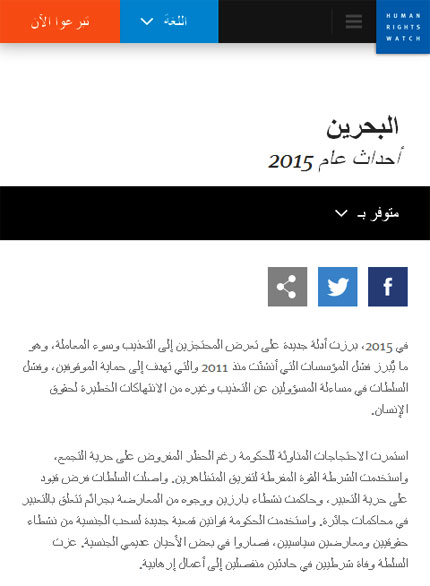
|
 |
 |
|
|
|
|
|
|
|
|
|
|
|
|
|
|
|
|
|
|
|
|
|
|
Bahrain in HRW’s Annual ReportHuman Rights Watch (HRW) released its World Report 2016, which claimed the existence of credible and consistent allegations of torture and mistreatment of detainees in Bahrain during 2015. According to the report, such allegations undermined claims of reform. While the Bahraini government and its friends, such as the United Kingdom, have contended that the new institutions established by Bahrain are effectively contributing to the development of the human rights situation and the protection of detainees, the report argues that these institutions have failed to provide protection, just as the authorities have failed to hold accountable those responsible for torture and other abuses.
The report said that the police forces still use excessive force to disperse demonstrators, and that restrictions on freedom of expression still exist, and trials of activists and prominent opposition figures for crimes related to expression still continue in courts lacking in fair trial standards. Authorities have attributed the death of two policemen, in two separate incidents, to terrorist acts, and complained of the escalation of violence and terrorism. HRW report noted that Bahraini lawyers complained about official practices that have the effect of circumventing the country’s legislative safeguards against torture, particularly the authorities’ failure to divulge the whereabouts of detained suspects, often for weeks at a time. Former detainees and families of inmates held at Jaw Prison alleged that security forces firing tear gas and bird shot used disproportionate force to quell violent unrest among prisoners there on March 10, 2015. As for the new institutions established by the authorities, such as the Special Investigations Unit (SIU) and the Ombudsman Office, the report insists that they are “still failing to hold security forces and high officials accountable for torture and serious mistreatment of persons in custody.” The SIU, claims the report, has not conducted investigations or prosecutions that have led to the conviction of any individuals for acts of torture in cases relating to Bahrain’s political unrest. According to HRW report, “The ombudsman, who accepts individual complaints and directs them to the appropriate investigatory authority, did not provide details concerning the 83 cases his office referred to the SIU”. With regard to freedom of expression and fair trial, HRW report referred to the arrest of human rights activist Nabeel Rajab. In May 2015, according to HRW, the Court of Aappeal upheld his six-month sentence issued in 2014 after he criticized the government on social media for the use of anti-terrorism laws to prosecute human rights defenders. Rajab has said that the Bahraini security forces belief in violence is similar to the practices of the Islamic State (ISIS). In July 2015, continues the report, the authorities announced that King Hamad had pardoned Rajab for health reasons, but the latter still faces charges related to the comments that led to his arrest in April, and is still banned from travelling. HRW report also referred to the arrest, by the authorities, of Ibrahim Sharif, Secretary General of the opposition National Democratic Action Society, for allegedly encouraging the government’s overthrow and “inciting hatred” in a speech that consisted solely of peaceful criticism of the government and calls for political reform. According to the report, the authorities had condemned Sharif in 2011, for being a member of a group that chose to “advocate the declaration of a republic in the country “ and he was sentenced to five years. However, the report continues, the authorities released Sharif 9 months before the expiration of his sentence, only to be arrested again two weeks after his release. On the other hand, HRW’s annual report alluded to the arrest of Sheikh Ali Salman, Secretary General of Al Wifaq Society, claiming that he was tried and convicted on June 16, 2015 on three speech-related charges, and sentenced to four years in prison. According to the report, the presiding court judge refused to allow Sheikh Salman’s defense lawyers to present potentially exculpatory evidence, including the speeches for which he was prosecuted, arguing that it is intended to cast doubt on the overwhelming evidence that convinced the court. The report noted that in August 2015, the Bahraini cabinet discussed a draft law on criminalizing “contempt of religions”, which would also criminalize “any hate and sectarian discourse that undermines national unity.” The cabinet referred the draft to the Ministerial Committee for Legal Affairs for further study. From HRW point of view, as a result of the 2014 amendment to Bahrain’s citizenship law, the Interior Ministry can, with cabinet approval, revoke the citizenship of any person who, is proved “to aid or is involved in the service of a hostile state” or who “causes harm to the interests of the Kingdom or acts in a way that contravenes his duty of loyalty to it.” HRW noted that on January 31, 2015, the Minister of Interior revoked the citizenship of 72 Bahrainis stating that they had been involved in “illegal acts,” including “inciting and advocating regime change through illegal means,” “defaming brotherly countries,” and “defaming the image of the regime.” HRW report added that the 72 individuals included former parliamentarians, doctors, politicians, human rights activists, and other Bahrainis alleged to have joined ISIS. |
